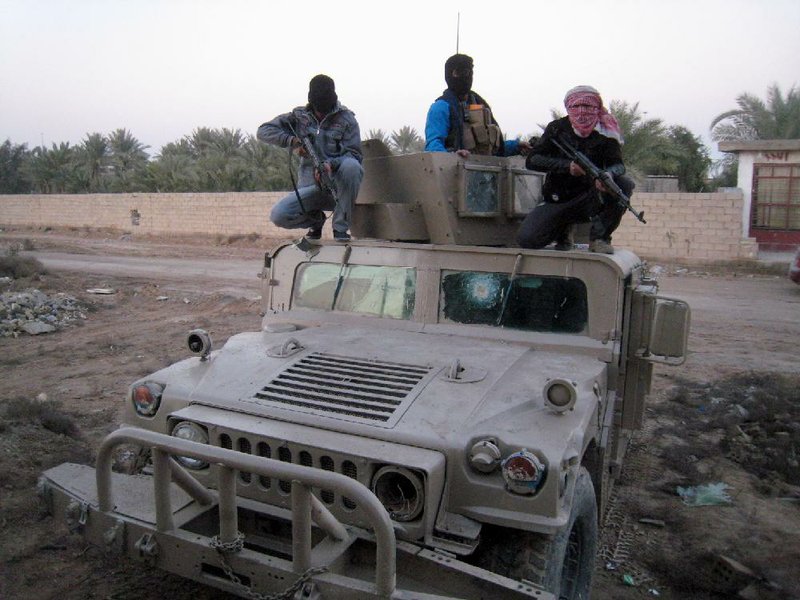BAGHDAD - A suicide bomber blew himself up at a military recruiting center in Baghdad on Thursday, killing at least 21 people as volunteers waited to join the army.
The attacker Thursday morning detonated his explosives outside the recruiting center in the Iraqi capital’s central Allawi neighborhood as volunteers were waiting to register inside, a police official said. At least 35 people were wounded in the blast, he said.
A hospital official confirmed the casualty numbers. Both officials spoke on condition of anonymity because they were not authorized to talk to the media.
There was no immediate claim of responsibility, but suicide attacks are the hallmark of al-Qaida’s Iraq branch, known as the Islamic State of Iraq and the Levant.
The blast struck as an international rights group warned of the apparent use of indiscriminate mortar fire in civilian areas by Iraqi forces in their campaign to reassert control over the cities of Fallujah and Ramadi.
Al-Qaida-linked fighters overran parts of both cities in the Sunni-dominated Anbar province last week, seizing control of police stations and military posts, freeing prisoners, and setting up their own checkpoints.
Iraqi troops, backed by pro-government Sunni militiamen, have been clashing with the fighters since and carrying out airstrikes against their positions in an effort to reassert control of the cities.
Tribal leaders in Fallujah, 40 miles west of Baghdad, have warned al-Qaida fighters there to leave to avoid a military showdown.
The United States, troops of which fought bloody battles in Fallujah and Ramadi, has ruled out sending American troops back in but has been delivering missiles to help bolster Iraqi forces, with more on the way.
House Speaker John Boehner, R-Ohio, said Thursday that the United States should provide more equipment and other aid.
He said President Barack Obama must get more involved in helping Iraq as it seeks to reclaim the two cities. Boehner said the U.S. has a vital national interest in Iraq and warned that the progress made by American forces before troops were withdrawn after nine years of war is being threatened.
“I think the president himself ought to take a more active role in dealing with the issues in Iraq,” Boehner said at his weekly news conference. “Secondly, we need to get equipment to the Iraqis and other services that would help them battle this counterterrorism effort that they’re attempting to do. There are things that we can do to help the Iraqis that do not involve putting U.S. troops on the ground.”
State Department spokesman Jen Psaki said the administration is working with Congress on getting helicopters to Iraq.
At a separate news conference, Senate Majority Leader Harry Reid, D-Nev., said the U.S. would assist Iraq but also ruled out sending American troops back. “They’re home. The American people are glad. They’re coming back from Afghanistan,” Reid said.
Vice President Joe Biden has spoken to Iraqi Prime Minister Nouri al-Maliki twice this week, voicing support for his government’s efforts to regain control of the cities and urging him to continue talks with local, tribal and national leaders.
Iran, too, is watching the unrest with alarm as it shares American concerns about al-Qaida-linked militants taking firmer root in Iraq. It has offered to supply military equipment and advisers to help fight militants in Anbar should Baghdad ask for assistance.
Human Rights Watch said Thursday that Iraqi forces appear to have used mortar fire indiscriminately in civilian areas in recent days in their effort to dislodge militants in Anbar, and that some residential areas were targeted with mortar shells and gunfire even though there were no signs of an al-Qaida presence in those specific areas.
The New York-based group said its allegations were based on multiple accounts provided by Anbar residents.
It also warned that a government blockade of Ramadi and Fallujah is limiting civilian access to food, water and fuel and that “unlawful methods of fighting by all sides” has caused civilian casualties and major property damage.
Several approaches to Fallujah have been blocked by Iraqi troops, and only families with children were being allowed to leave with “ extreme difficulty” through two checkpoints that remained open, the rights group said. It added that single men were not allowed to leave the city.
Iraqi government officials could not immediately be reached for comment to respond to the rights group’s allegations.
The warning came a day after the United Nations and the International Committee of the Red Cross voiced concerns about growing humanitarian threats in the area as food and water supplies start to run out.
Emergency shipments of food, water, blankets and other essential items have begun reaching families displaced by the fighting in Anbar, the U.N. said Thursday.
More than 11,000 families have been displaced because of the fighting, according to U.N. records.
Information for this article was contributed by Donna Cassata, Bradley Klapper and Lara Jakes of The Associated Press.
Front Section, Pages 6 on 01/10/2014


